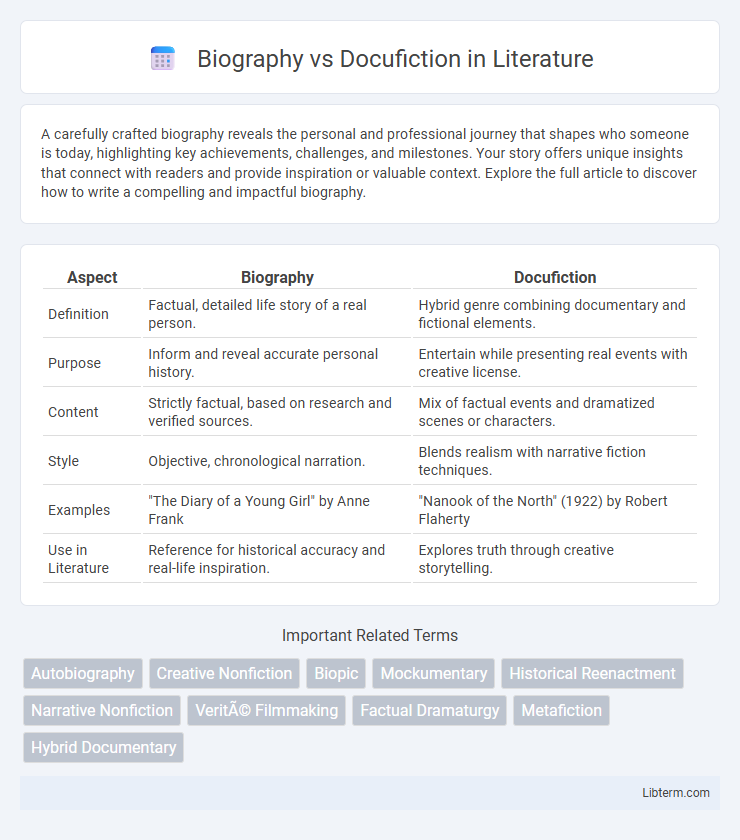A carefully crafted biography reveals the personal and professional journey that shapes who someone is today, highlighting key achievements, challenges, and milestones. Your story offers unique insights that connect with readers and provide inspiration or valuable context. Explore the full article to discover how to write a compelling and impactful biography.
Table of Comparison
| Aspect | Biography | Docufiction |
|---|---|---|
| Definition | Factual, detailed life story of a real person. | Hybrid genre combining documentary and fictional elements. |
| Purpose | Inform and reveal accurate personal history. | Entertain while presenting real events with creative license. |
| Content | Strictly factual, based on research and verified sources. | Mix of factual events and dramatized scenes or characters. |
| Style | Objective, chronological narration. | Blends realism with narrative fiction techniques. |
| Examples | "The Diary of a Young Girl" by Anne Frank | "Nanook of the North" (1922) by Robert Flaherty |
| Use in Literature | Reference for historical accuracy and real-life inspiration. | Explores truth through creative storytelling. |
Introduction to Biography and Docufiction
Biography presents a factual and detailed account of a person's life, emphasizing chronological events and verified information. Docufiction blends documentary and fictional elements to create a narrative that may include dramatized scenes while retaining a basis in real events. Both genres aim to explore human experiences but differ in their balance between factual accuracy and creative interpretation.
Defining Biography: Facts and Framework
Biography centers on the factual recounting of an individual's life, emphasizing verified events, dates, and personal achievements within a structured chronological framework. It relies on primary sources such as letters, diaries, official records, and eyewitness accounts to construct an accurate and comprehensive narrative. This genre prioritizes authenticity and objectivity, distinguishing itself from docufiction, which blends factual biography with fictionalized elements for dramatic effect.
Understanding Docufiction: Blurring Reality and Fiction
Docufiction merges documentary and fictional storytelling to create a narrative that blends factual events with imaginative elements, challenging traditional biography's reliance on verifiable facts. This genre uses real-life settings and authentic characters while incorporating dramatized scenes, enhancing emotional engagement and deeper insight into the subject. Understanding docufiction involves recognizing its purpose to evoke truth through fictionalized interpretation rather than presenting a strictly factual biography.
Historical Evolution of Biography
The historical evolution of biography traces its origins to ancient civilizations where accounts of rulers and heroes blended fact with mythology, gradually transitioning into more critical and evidence-based narratives during the Renaissance. Docufiction emerged in the 20th century as a hybrid genre, combining documentary realism with fictional storytelling to explore subjective perspectives while maintaining historical context. This fusion challenges traditional biography's emphasis on factual accuracy by integrating dramatization and creative interpretation.
The Rise and Development of Docufiction
Docufiction emerged in the late 20th century as a hybrid genre blending factual biography with fictional storytelling to enhance emotional engagement and narrative depth. This development allowed filmmakers to explore real-life subjects with creative freedom, using dramatized scenes alongside documentary footage to convey complex truths. The rise of docufiction reflects evolving audience preferences for immersive experiences that transcend traditional biography's limitations.
Key Differences Between Biography and Docufiction
Biography is a factual account of a person's life, emphasizing accurate and verifiable information supported by documents, interviews, and historical records. Docufiction combines documentary and fictional elements, blending real events with dramatized scenes to enhance storytelling while retaining some factual base. The key difference lies in biography's strict adherence to truth, whereas docufiction allows creative interpretation to convey emotional or thematic truths beyond mere facts.
Narrative Techniques and Storytelling Styles
Biography employs factual narration with chronological structure, emphasizing accuracy and verifiable events to present a subject's life authentically. Docufiction blends documentary realism with fictional storytelling, using creative reenactments and dramatized scenes to convey emotional truths beyond strict factuality. Both forms utilize interviews and archival materials, but docufiction prioritizes narrative flair and thematic depth over strict adherence to historical detail.
Audience Expectations and Reception
Biography audiences expect factual accuracy, detailed character development, and authentic representation of historical events, often seeking educational value and emotional connection. Docufiction viewers anticipate a blend of documentary realism with fictional storytelling, appreciating creative narrative techniques while accepting some dramatization and speculative elements. Reception varies as biographies are judged on credibility and depth, whereas docufictions are evaluated for their imaginative engagement and ability to provoke thought through a hybrid format.
Ethical Considerations in Both Genres
Biography demands strict adherence to factual accuracy and respect for the subject's privacy, emphasizing truthful representation supported by verifiable sources. Docufiction blends documentary and fictional elements, raising ethical concerns about misleading audiences through the dramatization or alteration of real events. Both genres require careful navigation of consent, representation, and the impact on the individuals portrayed to maintain integrity and audience trust.
Impact on Literature and Popular Culture
Biography offers a detailed, factual account of a person's life, shaping literature by preserving historical accuracy and inspiring readers through authentic narratives. Docufiction blends documentary and fictional elements, pushing creative boundaries and influencing popular culture by challenging perceptions of truth and memory. Both genres enrich storytelling but impact literature and media differently--biography anchors stories in reality, while docufiction provokes critical engagement and artistic innovation.
Biography Infographic

 libterm.com
libterm.com